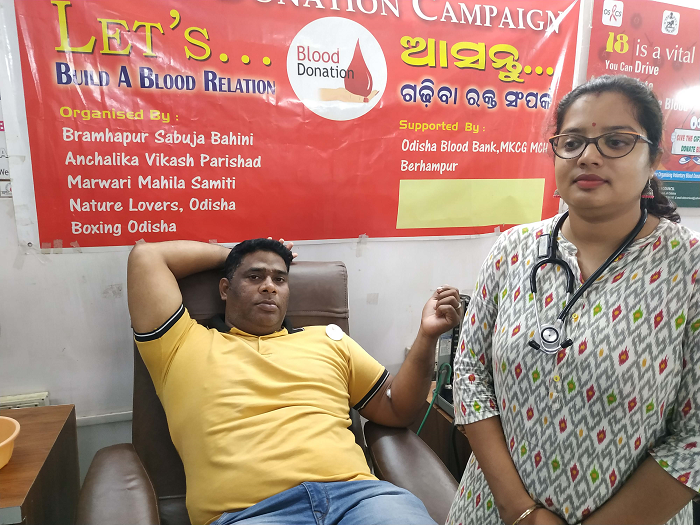Berhampur: The noble gesture of a man from Rourkela and the timely intervention of a MKCG Medical College and Hospital doctor here saved the life of a woman who desperately needed the rare ‘Bombay A+ve Blood’ blood for her treatment.
According to reports, Narayan Raita — a resident of Mandasingi village of Buratal panchayat under Patrapur block — got his wife Sabita admitted at MKCG Medical College and Hospital October 12 for delivery. She delivered a girl October 13 through caesarian section. Later, her condition deteriorated owing to excessive blood loss. Simultaneously, the newborn was admitted at the special newborn care unit as she weighed below normal.
The doctors while treating Sabita found blood transfusion was necessary. Upon testing, her blood group was found to be ‘Bombay A+ve’ – an extremely rare blood group.
The blood group’s nomenclature comes from the name of city Mumbai (then Bombay) where the rare blood group was first discovered by Dr YM Bhende in 1952. While the four most common blood groups are A, B, AB and O, the ‘Bombay A+ve’ comes under rarest of rare group bracket for its chances of presence. On an average one out of 2,50,000 people belong to this blood group in India.
Given the rarity of the blood group, the timely intervention of Dr Rashmita Panigrahi, in-charge of the blood bank at MKCG, helped matters a lot. She started searching for this blood group in all the blood banks across the state.
Unable to find any, she went out of her way and used WhatsApp groups to spread the messages through. And, it worked.
Dillip Barik, a Rourkela based man from a Bhubaneswar based blood donation group, responded in affirmative. Besides, he readily came forward to travel the distance and donate the blood.
Only after Dillip donated the blood, Sabita’s treatment could be started. Now her health condition is said to be improving.
Family members said but for the effort of Dr Panigrahi and the altruism nature of Dillip, Sabita’s treatment would have been impossible.
Dillip, who is a four time blood donor, says he was not aware of the exclusivity of his blood group. He learnt about it from a doctor and has since stopped donating blood at camps. Instead, he readily goes out to help the patients in need. “I really feel happy about saving someone’s life by donating blood,” said the man with a golden heart.
PNN
